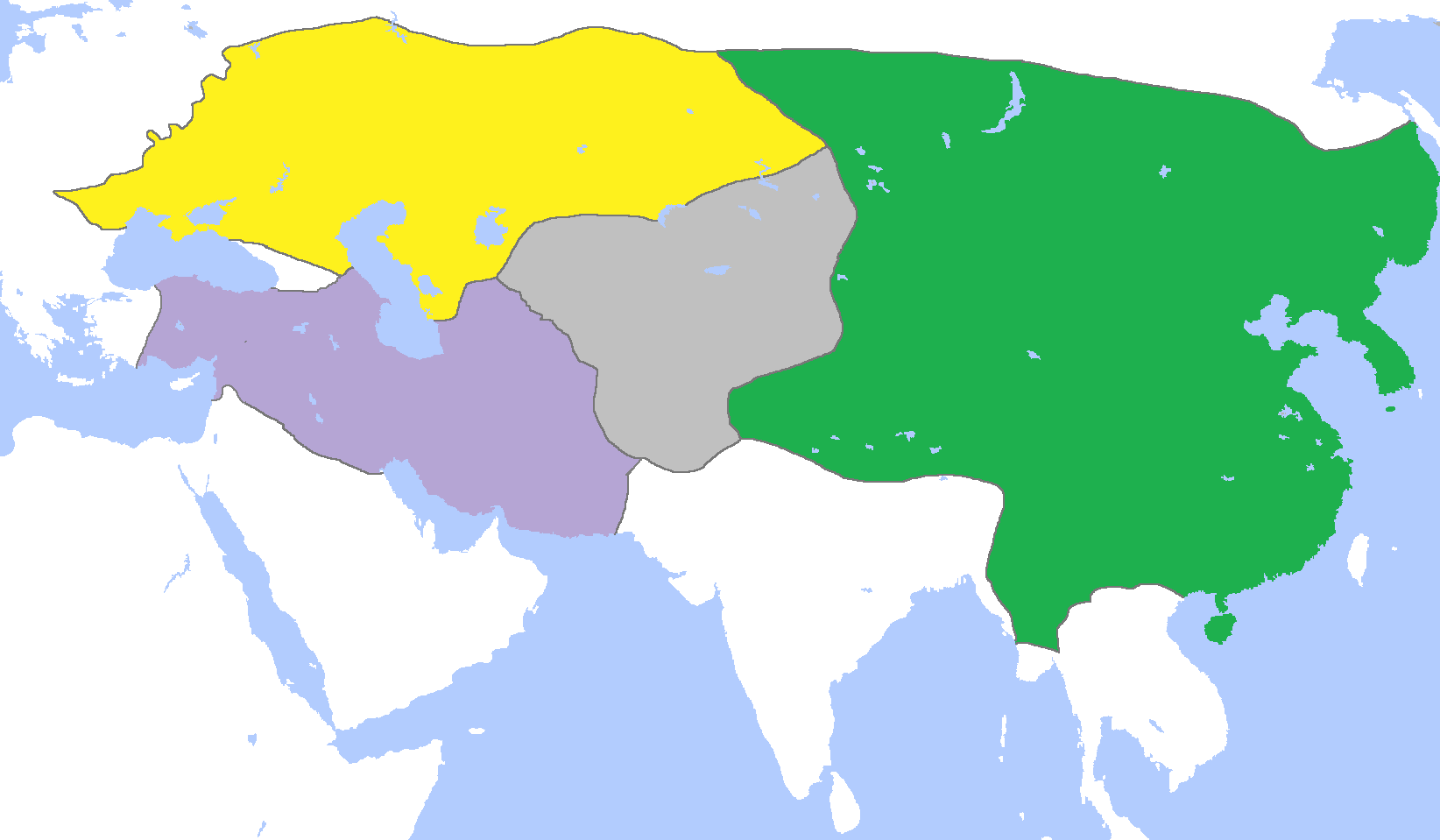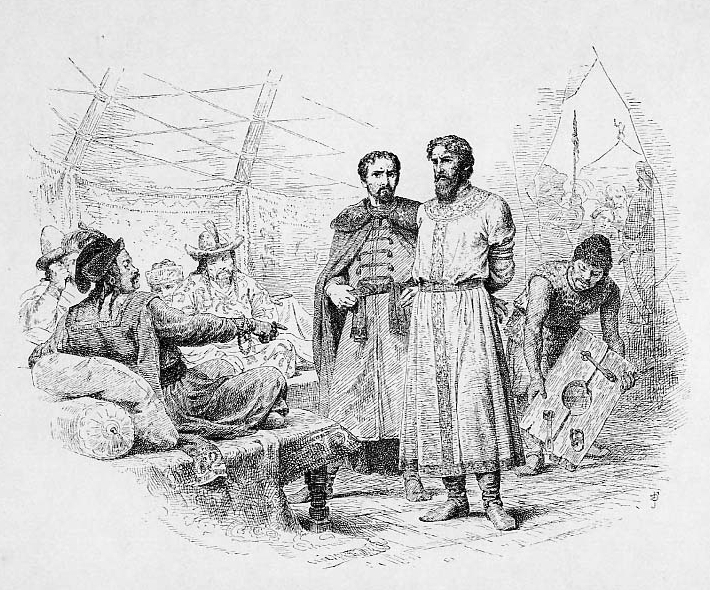|
Dyuden
Dyuden or Tudan () was a brother of Toqta, the khan of the Golden Horde and a great grandson of Batu Khan. He was appointed as a general by Toqta and his campaign devastated 14 towns in the territory of modern Russia in 1293, including Moscow, while the grand prince, Dmitry, was forced to flee to Pskov, allowing Andrey to take the title of grand prince. Dyudan had a son, Shchelkan, who was Özbeg Khan's ambassador in the Principality of Tver The Principality of Tver () was a Russian principality which existed between the 13th and the 15th centuries with its capital in Tver. The principality was located approximately in the area currently occupied by Tver Oblast and the eastern part of ... in 1327.Плюшар, А. АЭнциклопедический лексикон СПб. 1835—1841 References Sources * External linksWikisource entry (in Russian) Generals of the Mongol Empire Golden Horde Borjigin {{Mongol-Empire-stub ... [...More Info...] [...Related Items...] OR: [Wikipedia] [Google] [Baidu] |
Toqta
Tokhta (also spelled Toqta, Toktu, Tokhtai, Tochtu or Tokhtogha; died ) was Khan of the Golden Horde from 1291 to 1312. He was a son of Mengu-Timur and a great-grandson of Batu Khan. His name "Tokhtokh" means "hold/holding" in the Mongolian language. Early reign under Nogai Nogai Khan orchestrated a palace coup that ended with the ousting of Talabuga and his execution. Tokhta became khan in 1291 and at first he was subordinate to Nogai. However, Tokhta eventually united his supporters against Nogai and he challenged Nogai's authority in 1297, leading to a civil war. In 1299, Nogai finally defeated Nogai and stabilized the Golden Horde. Tokhta wanted to eliminate the Russian princes' semi-independence and the Russian princes grew increasing restive. As a form of submission, military service was used by the khans, but Russian auxiliary troops were only used in rare attacks in Poland and Hungary, as well as in military campaigns in the Caucasus. Russian troops remained eff ... [...More Info...] [...Related Items...] OR: [Wikipedia] [Google] [Baidu] |
Golden Horde
The Golden Horde, self-designated as ''Ulug Ulus'' ( in Turkic) was originally a Mongols, Mongol and later Turkicized khanate established in the 13th century and originating as the northwestern sector of the Mongol Empire. With the division of the Mongol Empire after 1259, it became a functionally separate khanate. It is also known as the Kipchak Khanate or the Ulus of Jochi, and replaced the earlier, less organized Cuman–Kipchak confederation. After the death of Batu Khan (the founder of the Blue Horde) in 1255, his dynasty flourished for a full century, until 1359, though the intrigues of Nogai Khan, Nogai instigated a partial civil war in the late 1290s. The Horde's military power peaked during the reign of Özbeg Khan (1312–1341), who adopted Islam. The territory of the Golden Horde at its peak extended from Siberia and Central Asia to parts of Eastern Europe from the Ural Mountains, Urals to the Danube in the west, and from the Black Sea to the Caspian Sea in the south ... [...More Info...] [...Related Items...] OR: [Wikipedia] [Google] [Baidu] |
Batu Khan
Batu Khan (–1255) was a Mongol ruler and founder of the Golden Horde, a constituent of the Mongol Empire established after Genghis Khan's demise. Batu was a son of Jochi, thus a grandson of Genghis Khan. His '' ulus'' ruled over the Kievan Rus', Volga Bulgaria, Cumania, and the Caucasus for around 250 years. Personality and appearance According to Giovanni da Pian del Carpine, Batu was "kind enough to his own people, but he is greatly feared by them. He is, however, most cruel in fight; he is very shrewd and extremely crafty in warfare, for he has been waging war for a long time." He received the nickname of сайн (), by which he was referred to by Marco Polo. William of Rubruck described him as about the height of his lord John de Beaumont and as having his entire face covered with reddish spots. Early years After his son Jochi's death, Genghis Khan assigned Jochi's appanages to his sons. The Great Khan installed Batu as Khan of the Golden Horde (also known as t ... [...More Info...] [...Related Items...] OR: [Wikipedia] [Google] [Baidu] |
Russia
Russia, or the Russian Federation, is a country spanning Eastern Europe and North Asia. It is the list of countries and dependencies by area, largest country in the world, and extends across Time in Russia, eleven time zones, sharing Borders of Russia, land borders with fourteen countries. Russia is the List of European countries by population, most populous country in Europe and the List of countries and dependencies by population, ninth-most populous country in the world. It is a Urbanization by sovereign state, highly urbanised country, with sixteen of its urban areas having more than 1 million inhabitants. Moscow, the List of metropolitan areas in Europe, most populous metropolitan area in Europe, is the capital and List of cities and towns in Russia by population, largest city of Russia, while Saint Petersburg is its second-largest city and Society and culture in Saint Petersburg, cultural centre. Human settlement on the territory of modern Russia dates back to the ... [...More Info...] [...Related Items...] OR: [Wikipedia] [Google] [Baidu] |
Dmitry Of Pereslavl
Dmitry Alexandrovich (; 1250–1294) was Grand Prince of Vladimir from 1276 to 1281, and again from 1283 until 1293. Biography Dmitry was the second son of Alexander Nevsky. When his elder brother Vasily died young, Dmitry remained the chief heir to his illustrious father. As early as 1259, he was left by Alexander in charge of Novgorod. Upon Alexander's death in 1264, however, the Novgorodians expelled Dmitry to his native Pereslavl-Zalessky, citing his youth as a pretext. Four years later, when Dmitry had turned 18, he was welcomed back to Novgorod and — together with his future son-in-law, Daumantas of Pskov — led a local militia against Livonian Knights in the Battle of Rakvere. During the following decade, he struggled for control of Novgorod against his uncles, Yaroslav III and Vasily of Kostroma. In 1276, when his elders died, he finally ascended the coveted thrones of Vladimir and Novgorod. Two years later, he founded a great fortress of Koporye, which he ... [...More Info...] [...Related Items...] OR: [Wikipedia] [Google] [Baidu] |
Pskov
Pskov ( rus, Псков, a=Ru-Псков.oga, p=psˈkof; see also Names of Pskov in different languages, names in other languages) is a types of inhabited localities in Russia, city in northwestern Russia and the administrative center of Pskov Oblast, located about east of the Estonian border, on the Velikaya, Velikaya River. Population: Pskov is one of the oldest cities in Russia. During the Middle Ages, it served as the capital of the Pskov Republic and was a trading post of the Hanseatic League before it was incorporated into the Grand Duchy of Moscow and became an important border fortress in the Tsardom of Russia. History Early history Pskov is one of the oldest cities in Russia. The name of the city, originally Pleskov (historic Russian spelling , ), may be loosely translated as "[the town] of :wikt:purling, purling waters". It was historically known in English as Plescow. Its earliest mention comes in 903, which records that Igor of Kiev married a local lady, Olga ... [...More Info...] [...Related Items...] OR: [Wikipedia] [Google] [Baidu] |
Andrey Of Gorodets
Andrey III Alexandrovich (ca. 1255 – 27 July 1304), a Rus’ prince, son of Alexander Nevsky, received from his father the town of Gorodets on the Volga. In 1276 he added Kostroma to his possessions and joined the struggle for the Grand Duchy of Vladimir-Suzdal. In 1281, joining the Mongol army, Andrey expelled his elder brother Dmitri from Vladimir. After some feasting with Mongols in Vladimir, Andrey went to Novgorod, where the populace made him heartily welcome. Meanwhile, his brother allied himself with the powerful Mongol general Nogai Khan, who reinstated Dmitry as Grand Duke of Vladimir in 1283. During the following decade, Andrey thrice brought the Mongols to Rus’ in order to wrest Vladimir from his brother. In the campaign of 1293 they pillaged 14 Russian towns, finally forcing Dmitry to abdicate. Even when elevated to the grand-ducal throne of Vladimir, Andrey continued to live in Gorodets. During the last decade of his reign he struggled with a league formed by ... [...More Info...] [...Related Items...] OR: [Wikipedia] [Google] [Baidu] |
Özbeg Khan
Giyasuddin Muhammad Uzbek Khan, better known as Özbeg (1282–1341), was the longest-reigning Khan (title), khan of the Golden Horde (1313–1341), under whose rule the state reached its zenith. He was succeeded by his son Tini Beg. He was the son of Toghrilcha and grandson of Mengu-Timur, who had been khan of the Golden Horde from 1266 to 1280. Biography Öz Beg's father Family tree of Genghis Khan#Genghis Khan's descendants, Togrilcha was one of the Descent from Genghis Khan, Genghisid princes that overthrew Tuda Mengu, Tode-Mengu (r. 1280–1287). Later, he was executed by his brother Toqta (1291–1312). Toqta took Togrilcha's widow for wife and sent his son Öz Beg to exile in a distant region of the Golden Horde: either Khorazm or the country of Circassians. Converted to Islam by Ibn Abdul Hamid, a Sunni Sufi Bukharan sayyid and sheikh of the Khoja Akhmet Yassawi, Yasavi order, Öz Beg assumed the throne upon the death of his uncle Toqta in January 1313 with the help o ... [...More Info...] [...Related Items...] OR: [Wikipedia] [Google] [Baidu] |
Principality Of Tver
The Principality of Tver () was a Russian principality which existed between the 13th and the 15th centuries with its capital in Tver. The principality was located approximately in the area currently occupied by Tver Oblast and the eastern part of Smolensk Oblast. It was one of the states established after the fall of Kievan Rus'. Originally part of the Pereyaslavl-Zalessky principality, Tver became an independent principality when Yaroslav of Tver, Yaroslav Yaroslavich was given the western slice of his father's patrimony. During the 14th century, Tver rivaled the Principality of Moscow with the aim to become the center of the unified Russian state. Eventually it lost, decayed, and in 1485, it was annexed by Moscow. History Origins In the 1230s or the 1240s, Yaroslav II of Vladimir, Yaroslav Vsevolodovich, the grand prince of Vladimir, detached the city of Tver from the Pereyaslavl-Zalessky principality (where it previously belonged), and gave it to his son Alexander Nevsky, A ... [...More Info...] [...Related Items...] OR: [Wikipedia] [Google] [Baidu] |
Generals Of The Mongol Empire
A general officer is an officer of high rank in the armies, and in some nations' air and space forces, marines or naval infantry. In some usages, the term "general officer" refers to a rank above colonel."general, adj. and n.". OED Online. March 2021. Oxford University Press. https://www.oed.com/view/Entry/77489?rskey=dCKrg4&result=1 (accessed May 11, 2021) The adjective ''general'' had been affixed to officer designations since the late medieval period to indicate relative superiority or an extended jurisdiction. French Revolutionary system Arab system Other variations Other nomenclatures for general officers include the titles and ranks: * Adjutant general * Commandant-general * Inspector general * General-in-chief * General of the Air Force (USAF only) * General of the Armies of the United States (of America), a title created for General John J. Pershing, and subsequently granted posthumously to George Washington and Ulysses S. Grant * (" general admiral" ... [...More Info...] [...Related Items...] OR: [Wikipedia] [Google] [Baidu] |



